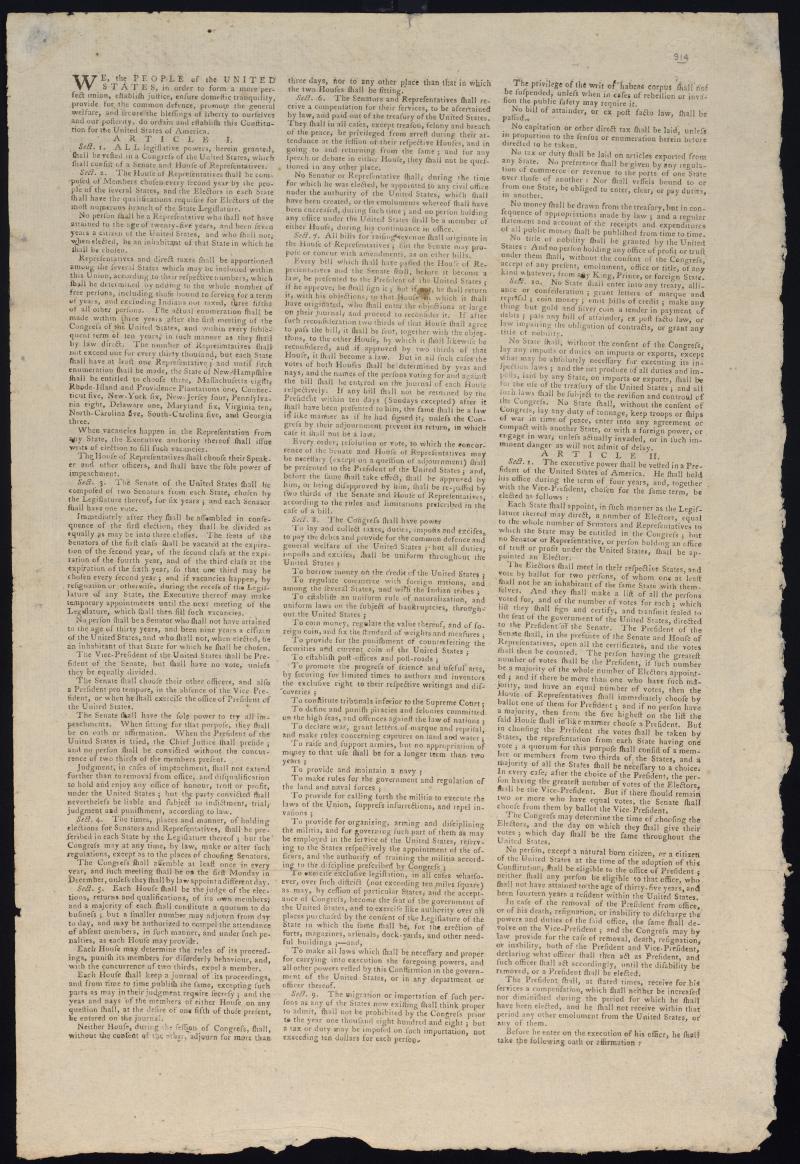Constitution of the United States (page 1 of 2)
Constitution of the United States (page 1 of 2)
This is the United States Constitution as originally written and ratified. It has been amended twenty-seven times, and several passages of the original Constitution are no longer in force. We've struck through each of these passages and linked it to the amendment that altered it.
Preamble
Article I. The legislative branch of government -- that is, Congress.
Section 1. Two houses of Congress.
Section 2. The House of Representatives.
Section 3. The Senate.
Section 4. When the Congress is elected and meets.
Section 5. Internal rules of each house.
Section 6. Compensation of representatives and senators.
Section 7. How laws are passed.
Section 8. Specific powers of Congress.
Section 9. Powers prohibited to Congress.
Section 10. Limitations on the powers of the states.
Article II. The executive branch of government -- that is, the President.
Section 1. How the President is elected; who may become President.
Section 2. Powers of the President.
Section 3. Duties of the President.
Section 4. How the President may be removed from office.
Article III. The judicial branch of government -- that is, the courts.
Section 1. Establishing courts and judges.
Section 2. Powers of the courts; trial by jury.
Section 3. Treason.
Article IV. The relationship of the United States government to the states.
Section 1. States must respect one another's laws, governments, and courts.
Section 2. Relationship of states to citizens of other states.
Section 3. Adding new states to the union.
Section 4. Responsibilities of the United States government to the states.
Article V. How the Constitution may be changed.
Article VI. The Constitution shall be the supreme law of the land.
Article VII. How the Constitution will take effect.
Errors in the original text
Signers of the Constitution

Public Domain
Public Domain is a copyright term that is often used when talking about copyright for creative works. Under U.S. copyright law, individual items that are in the public domain are items that are no longer protected by copyright law. This means that you do not need to request permission to re-use, re-publish or even change a copy of the item. Items enter the public domain under U.S. copyright law for a number of reasons: the original copyright may have expired; the item was created by the U.S. Federal Government or other governmental entity that views the things it creates as in the public domain; the work was never protected by copyright for some other reason related to how it was produced (for example, it was a speech that wasn't written down or recorded); or the work doesn't have enough originality to make it eligible for copyright protection.
Add a comment
PLEASE NOTE: NCpedia provides the comments feature as a way for viewers to engage with the resources. Comments are not published until reviewed by NCpedia editors at the State Library of NC, and the editors reserve the right to not publish any comment submitted that is considered inappropriate for this resource. NCpedia will not publish personal contact information in comments, questions, or responses. If you would like a reply by email, note that some email servers, such as public school accounts, are blocked from accepting messages from outside email servers or domains. If you prefer not to leave an email address, check back at your NCpedia comment for a reply. Please allow one business day for replies from NCpedia. Complete guidelines are available at https://ncpedia.org/about.